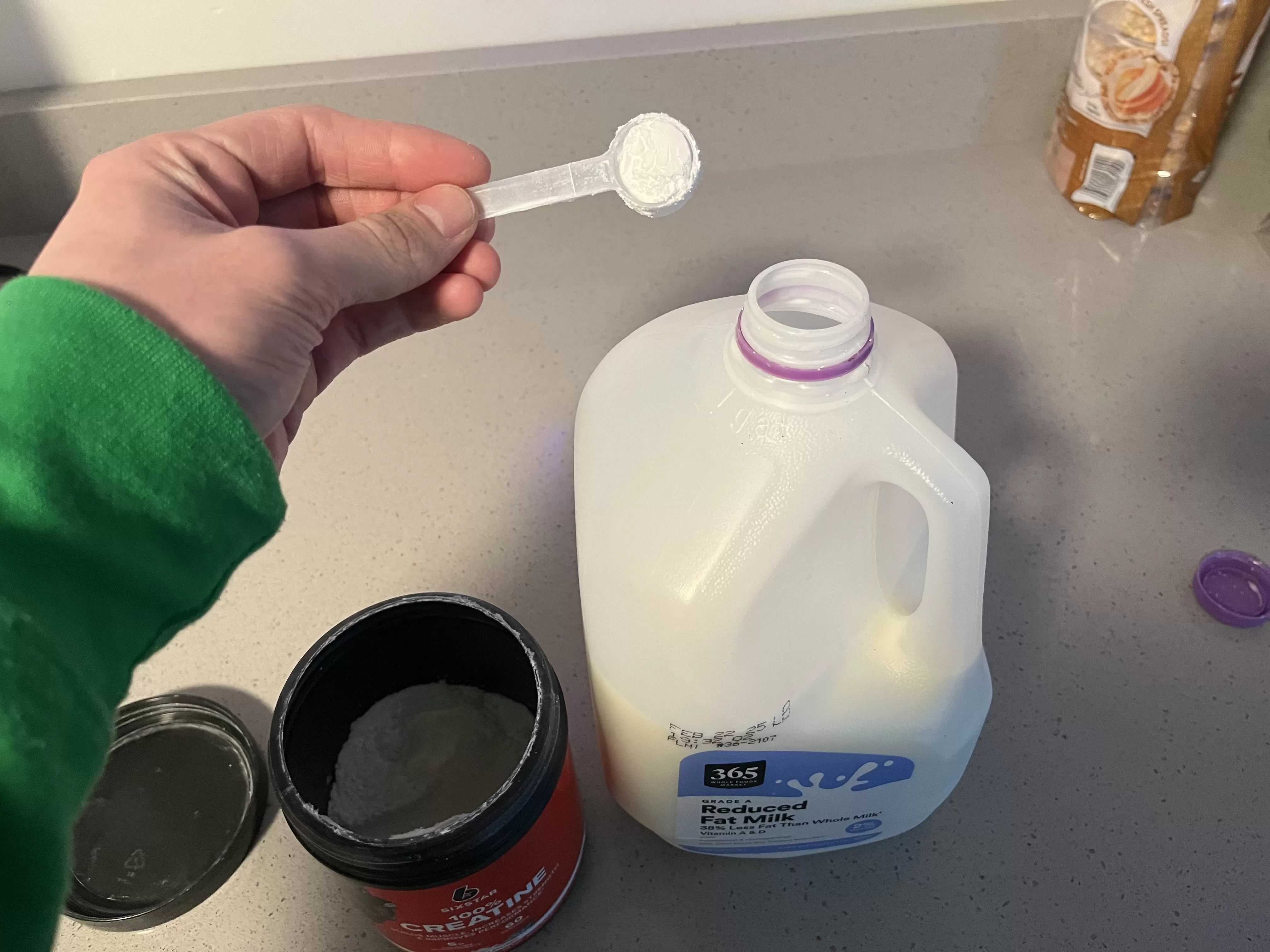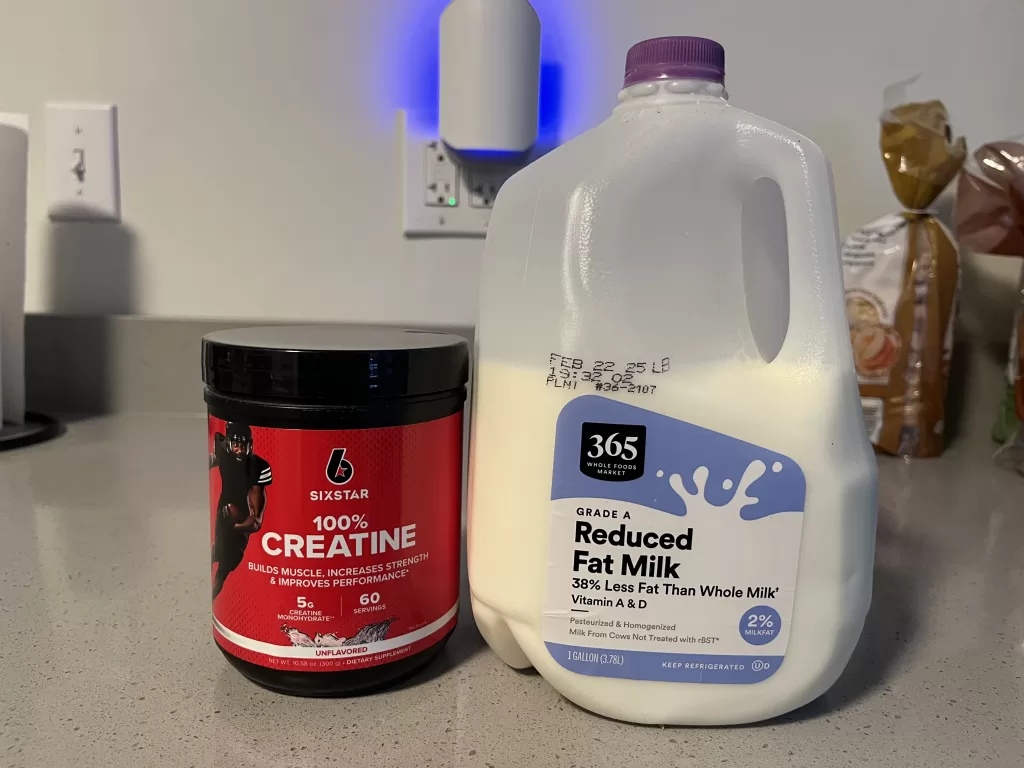Creatine is one of the most researched and widely used supplements in the fitness world. Whether you’re trying to build muscle, boost performance, or improve recovery, creatine can help. But instead of mixing it with water, some people wonder—can you take creatine in milk?
The short answer is yes, you can take creatine in milk! But there’s more to it than just dumping a scoop into a glass of milk. In this article, we’ll break down what creatine is, its benefits, how milk plays a role, and the best ways to take creatine with milk.
What is Creatine?
Creatine is a natural compound found in small amounts in foods like red meat and fish. It’s also produced by your body, primarily in the liver, kidneys, and pancreas. Your muscles use creatine to help generate energy during high-intensity activities, like weightlifting and sprinting.
When you take a creatine supplement, it increases the amount of stored creatine in your muscles, improving strength, endurance, and recovery. That’s why it’s so popular among athletes and bodybuilders.
The most common form of creatine supplement is creatine monohydrate, known for its effectiveness and affordability.
Benefits of Creatine
Creatine does a lot more than just help with workouts.
Here are some of its key benefits of creatine:
1. Increased Strength and Power
Creatine helps muscles produce more energy, leading to better performance in weightlifting and explosive movements.
2. Faster Muscle Growth
By improving performance and recovery, creatine supports muscle gains over time.
3. Enhanced Recovery
Creatine reduces muscle cell damage and inflammation, speeding up recovery between intense workouts.
4. Improved Brain Function
Creatine isn’t just for muscles—it also helps brain function, improving memory and mental fatigue.
5. More Energy for High-Intensity Exercise
Creatine enhances ATP (energy) production, allowing you to push harder in workouts.
With all these benefits, adding creatine to your routine makes sense. But what happens when you mix it with milk?
Nutritional Profile of Milk
Milk is packed with nutrients, making it a great base for mixing supplements. Here’s what you get in an 8-ounce (240ml) serving of whole milk:
- Calories: ~150
- Protein: 8g
- Carbs (Lactose): 12g
- Fats: 8g
- Calcium, Vitamin D, and Other Minerals
Milk provides protein and carbohydrates, which help support muscle growth and recovery. But does it work well with creatine?
Creatine in Milk
When you mix creatine in milk, you’re combining the supplement with a nutrient-rich liquid that can support muscle recovery. But some people wonder whether milk affects creatine’s absorption or effectiveness.
The good news? Milk does not reduce the effectiveness of creatine. In fact, the extra carbs and proteins may even enhance its uptake.
Can You Mix Creatine in Milk?

Yes, you can! There’s no scientific reason to avoid mixing creatine with milk. Here’s why it works:
- Improved Absorption – The carbs in milk help spike insulin, which can aid in creatine uptake.
- Better Taste – Some people find plain creatine unappealing. Mixing creatine in milk improves the flavor.
- Added Nutrients – You get protein, calcium, and vitamins, which help with muscle recovery.
The only downside? If you’re lactose intolerant, milk might cause digestive issues. But if your stomach handles dairy well, creatine in milk is a great combination.
Does Creatine Dissolve in Milk?
Creatine dissolves better in warm liquids than in cold ones. In cold milk, creatine may clump up slightly, but stirring or shaking it well will help. If you want it to dissolve more easily:
- Use lukewarm milk instead of cold milk.
- Stir vigorously or use a blender.
- Let it sit for a minute before drinking to allow better dissolution.
Since creatine doesn’t fully dissolve in any liquid (including water), you may notice some residue at the bottom of your glass. That’s normal! Just give it another stir or swirl before drinking.
Benefits of Creatine in Milk
While creatine works just fine in water, mixing creatine in milk has some added benefits:
- Extra Calories for Muscle Growth – If you’re trying to bulk up, milk provides extra calories without needing another meal.
- Protein Boost – Milk contains protein, which helps with muscle recovery.
- Better Taste – Creatine can be gritty and flavorless. Milk helps make it smoother and tastier.
- Smoother Digestion – Some people find creatine mixed with milk easier on the stomach compared to water.
If you’re looking for an easy way to get more protein, calories, and nutrients while taking creatine, milk is a great option.
Other Drinks You Can Mix with Creatine
If milk isn’t your thing, here are other great options:
- Water – The simplest and most convenient option.
- Juice (like orange or grape juice) – The sugar helps with creatine absorption.
- Smoothies – Blend creatine with fruits, yogurt, and protein for a nutrient-dense shake.
- Plant-Based Milks (Almond, Soy, Oat, etc.) – Good alternatives for lactose-intolerant individuals.
- Electrolyte Drinks – Help with hydration and performance.
The best option depends on your personal preference and dietary goals.
Best Way to Take Creatine
To get the most out of creatine, follow these simple tips:
- Stick to the Right Dosage – 3-5 grams per day is enough for most people.
- Be Consistent – Take creatine every day for best results.
- Mix it Well – Whether in milk, water, or juice, stir or shake thoroughly.
- Pair it with a Meal – Taking creatine with food can help with absorption.
- Hydrate – Drink plenty of water, as creatine pulls water into your muscles.
Conclusion
So, can you take creatine in milk? Absolutely! Not only is it safe, but it can also offer extra protein, calories, and a better taste. If you don’t have lactose intolerance, mixing creatine with milk is a solid choice.
However, if you prefer water, juice, or another liquid, that works too. The key is consistency—taking creatine daily will give you the best results, no matter what you mix it with.
FAQs About Creatine in Milk
1. Does milk affect creatine absorption?
No, milk does not negatively affect creatine absorption. The carbs in milk may even enhance uptake.
2. Is it okay to take creatine with warm milk?
Yes! Warm milk can help creatine dissolve better.
3. Will creatine in milk cause stomach issues?
If you’re lactose intolerant, taking creatine in milk might cause stomach issues. Otherwise, it’s generally easy to digest.
4. Can I mix creatine in chocolate milk?
Yes! Chocolate milk provides protein, carbs, and a delicious taste, making it a great option.
5. What’s the best time to take creatine with milk?
Anytime works, but post-workout with a meal may help with muscle recovery.
Now that you know the best ways to take creatine in milk, give it a try and see how it fits into your routine!








